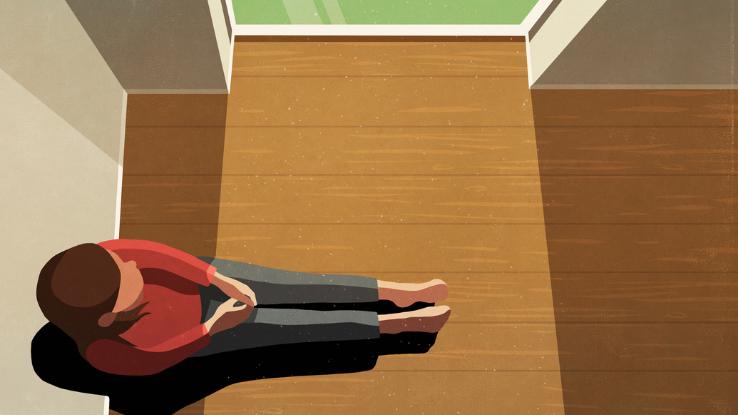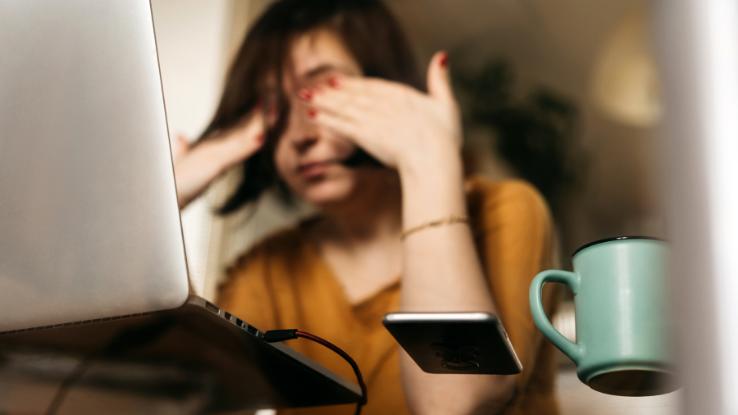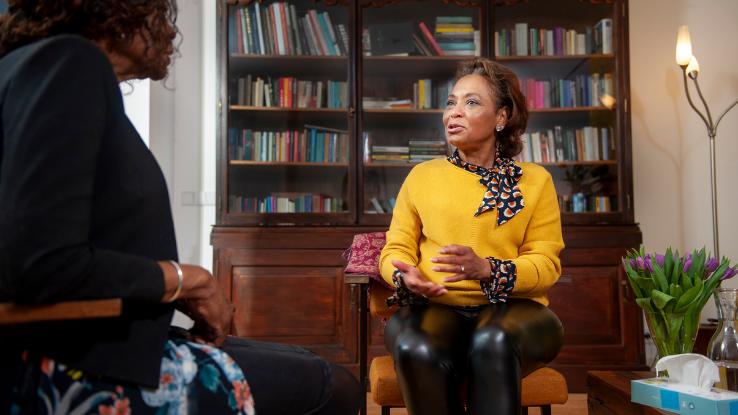What Is Mood Congruent Memory
What Is Depression? Everything You Need to Know Nigh This Mood Disorder

Some feelings of sadness or changes in mood are normal parts of the human experience. Nevertheless, in that location are times when your mood tin can begin to interfere with daily life. Depression is a mood disorder that includes feelings of sadness, helplessness and hopelessness that don't go away on their own. It's common for people who are depressed to take trouble participating in many key aspects of life — including work, school, friendships, family, sex and social relationships.
Low is a common condition, impacting over 250 million people of all ages, races and genders all over the world. Just due to social stigma and lack of access to intendance, experts estimate that less than a quarter of people with depression in low and middle-income regions go the handling they need. Without treatment and support, depression carries a high risk of disability or death by suicide.
Low can be difficult to empathise and talk over, specially with friends and family unit. People with depression may feel lost, isolated or worried about judgment from their peers. Information technology's important to recollect that depression is a existent illness with effective treatments and that recovery is possible. Learn more than about causes of depression and available treatment options.
Depression symptoms can vary profoundly from person to person. Episodes of low may be mild, moderate or astringent. They tin can come and go, or last for months or years at a time. For most people, depression happens gradually — symptoms begin slowly and worsen over time.

Mutual emotional and behavioral symptoms of low include:
- Feeling sad, empty, hopeless or guilty
- Losing interest in or pleasure from activities
- Feeling agitated or irritable
- Feeling very tired or sleeping too much or too picayune
- Having problem concentrating, thinking, speaking or making decisions
- Thinking often near death or suicide
Depression tin also cause more concrete symptoms, including:
- Changes in appetite, weight loss or weight gain
- Dorsum hurting, headaches or body aches
If you accept depression symptoms that are interfering with your solar day-to-day life, talk with a doctor nigh getting treatment. And if you're thinking near suicide, call the National Suicide Prevention Lifeline. They offer free and confidential support, 24 hours a day.
Causes & Risk Factors
The exact crusade of clinical depression is unknown, and people feel symptoms for a variety of reasons. Sometimes it's related to a specific outcome. For example, you may experience sad and take trouble performance for a short time when coping with a difficult or traumatic situation. Other people may feel low for no identifiable reason over a longer period of time.
There are many factors that take been linked with increased take chances of depression, including:
- Biological factors: The brain'south ability to regulate moods depends on chemicals called neurotransmitters. Decreases in sure neurotransmitter chemicals (serotonin, norepinephrine and dopamine) likely play a role in depression for some people.
- Genetic factors: People with a family unit history of depression are more probable to experience it themselves. Further research is needed to find out which genetic changes may be involved in depression.
- Hormonal factors: Changes in your torso's hormone levels tin can take an touch on your overall mood. These changes may exist related to thyroid problems, or to life events that naturally impact hormone levels, like puberty, pregnancy or menopause.
In addition, the following ecology factors and life events are also linked to a college risk of depression:
- Concrete or sexual abuse
- Death or loss of a loved one
- Loss of a job or fiscal stressors
- Substance use
- Chronic illness or disability
- Certain medications
Assessment & Diagnosis
Depression symptoms are easy to overlook. Family unit and friends can play an important role in noticing signs of depression, like changes in beliefs. If you lot or someone you care about is feeling depressed, talk with a doctor. Talking about your symptoms is the showtime step in diagnosing the problem and finding support.
Low tin be diagnosed by any of the post-obit professionals:
- Primary care providers
- Psychiatrists
- Psychologists
There are no laboratory tests or concrete exams available to diagnose depression. Only your doctor may social club blood tests to check for other health weather condition that can cause symptoms similar to depression — like thyroid problems, infections, or vitamin or hormone level changes. They may likewise provide screening for depression using a questionnaire tool that asks nearly your symptoms.
After this initial screening, your main care doctor may refer you to a specialist, like a psychiatrist or psychologist. To diagnose depression, these specialists may ask about your personal and family health history, recent mood and behaviors, relationships, professional satisfaction, exercise habits and overall quality of life. They'll look for whatsoever patterns that show that yous may accept a mood disorder.
Depression symptoms must last for at least 2 weeks in social club to get a clinical diagnosis. Some types of depression that a doctor may diagnose include:
- Major depressive disorder: This is the clinical term for low that tin can be persistent or periodic.
- Seasonal affective disorder (Lamentable): SAD is a form of low that happens during detail seasons. Most people with SAD experience depressed in the autumn and wintertime when the weather is common cold and there are fewer daylight hours.
- Postpartum depression: This type of depression happens after pregnancy and birth.
- Premenstrual dysphoric disorder: This mood problem happens before your period each calendar month and tin involve severe symptoms of depression.
- Bipolar disorder: This disorder involves farthermost mood swings, with periods of low likewise as periods of euphoria or mania.
Treatment Options to Manage Low
If you've been diagnosed with low, there are many treatment options bachelor. You can piece of work with your md to make a handling plan based on your symptoms and preferences. Handling is usually outpatient, but there are too more intensive inpatient (overnight) treatment programs. Hospitalization may exist necessary for people who are an immediate run a risk to themselves or others.
Virtually often, people with depression can find significant relief from their symptoms with one or more of the following approaches:
- Individual therapy (also chosen psychotherapy or talk therapy): Mental wellness professionals may use private therapy to help address low symptoms, back up coping skills, or help you adjust your beliefs, behaviors and relationships.
- Medication: Your doctor may prescribe psychiatric medications chosen antidepressants. These medications can take up to four weeks to take outcome, and you may need to try multiple kinds to find one that's right for y'all.
- Brain stimulation therapy: Transcranial magnetic stimulation (TMS) or electroconvulsive therapy (ECT) can directly stimulate the encephalon. Your doc may recommend this selection if antidepressants and talk therapy are not constructive.

In addition to these treatment options, there are steps you lot can take to care for yourself and support a balanced and stable mood. This way, you may be able to address balmy depression before it becomes a more serious problem.
- Exist agile: Even light practice can aid you clear your mind, relieve stress and feel more residual in your life. Many people report an improvement in their mood and quality of life when working out.
- Get your annual physical exam: When you become your yearly concrete, your doctor can screen you for depression. This can be a not bad opportunity to assess your mood and any recent changes, and get any treatment you may need. If you don't have a regular doctor, acquire how to find a doctor near you.
- Discover social support: Discover a group of friends or a community to share mutual interests. Make an effort to participate in activities that keep you lot engaged and motivated. Effort volunteering or joining a social club. These networks can become sources of support when y'all're feeling down or depressed.
- Become enough slumber: Healthy slumber habits tin can lower your take a chance of depression. Practice your all-time to get a full night's rest every night. If y'all have problem falling asleep or wake up throughout the night, talk with your doctor virtually your sleep issues.
- Swallow healthy: Skilful nutrition may help amend symptoms like fatigue and irritability. A proficient first stride is to attempt to eat more fruits and veggies.
- Avoid alcohol and drug use: Staying away from alcohol and drugs can as well accept a big touch on on your moods. If you think you may have a trouble with booze or drugs, talk with your dr. about handling for substance use disorder.
And if you're a parent, teach your child nigh alarm signs of low. Kids and teens don't always understand what they're feeling, and may feel ashamed to discuss their feelings openly. Try to help them experience comfortable past providing data and beingness a source of back up.
Side by side Steps in Managing Depression
If y'all notice behavior or mood changes in yourself or a loved one that last more than than ii weeks, talk with a medico right away. You can work together to find support and build a treatment programme to ease your symptoms.
And if yous ever have thoughts of suicide or self-harm, contact a suicide prevention hotline like the National Suicide Prevention Lifeline, The Trevor Project or Trans Lifeline. Trained counselors are available 24 hours a solar day to provide gratuitous, confidential support and connect you with the care yous need.
Resources Links:
- "Depression" via Globe Wellness Organisation (WHO)
- "Depression" via National Plant of Mental Health (NIMH)
- "Depression — Symptoms & Causes" via Mayo Dispensary
- "What Is Low?" via American Psychiatric Clan
- National Suicide Prevention Lifeline
- The Trevor Project
- Trans Lifeline
What Is Mood Congruent Memory,
Source: https://www.thehealthfeed.com/health-conditions/depression-condition-page?utm_content=params%3Ao%3D1668962%26ad%3DdirN%26qo%3DserpIndex&ueid=08a115e3-5032-46b3-b0f4-4be3cdff8e9e
Posted by: moorehicave.blogspot.com


0 Response to "What Is Mood Congruent Memory"
Post a Comment